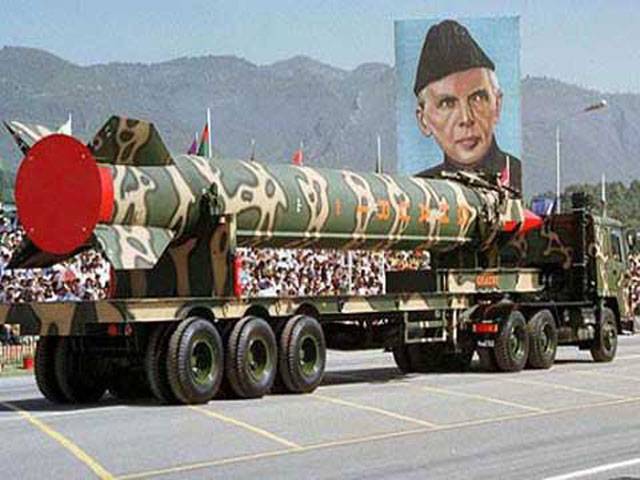WASHINGTON - Pakistan, which conducted nuclear tests in May 1998 in response to India’s atomic explosions, is now outpacing its South Asian rival in the development of nuclear warheads and its arsenal could become world’s third-biggest within a decade, a new report by two American think tanks asserts.
“Pakistan has the capability to produce perhaps 20 nuclear warheads annually; India appears to be producing about five warheads annually,” the report by the Carnegie Endowment for International Peace and the Stimson Center says. “But given its larger economy and sizable nuclear infrastructure, India is able to overtake Pakistan in fissile material and warhead production if it chooses to do so.”
The report, which was released on Thursday, says Pakistan is rapidly expanding its nuclear capabilities, and it could have at least 350 nuclear weapons within five to 10 years. Pakistan then would probably possess more nuclear weapons than any country except the United States and Russia, which each have thousands of the bombs.
Pakistan has never given out any figure about the number of weapons it posses, but, according to published estimates, Pakistan has about 120 nuclear warheads, while India has about 100.
In the coming years, the report states, Pakistan’s advantage could grow dramatically because it has a large stockpile of highly enriched uranium that could be used to quickly produce low-yield nuclear devices.
India has far larger stockpiles of plutonium, which is needed to produce high-yield warheads, than Pakistan does. But the report says India appears to be using most of its plutonium to produce domestic energy. “The growth path of Pakistan’s nuclear arsenal, enabled by existing infrastructure, goes well beyond the assurances of credible minimal deterrence provided by Pakistani officials and analysts after testing nuclear devices,” the report states.
A report in The Washington Post said that Pakistani military officials were not available to comment on the report when it was made available to journalists on Wednesday. It said several Pakistani analysts questioned the findings of the report, saying it is based on a faulty assumption that Pakistan is using all of its existing stockpiles of fissile material to make nuclear weapons.
Mansoor Ahmed, a nuclear expert at Quaid-i-Azam University in Islamabad, was quoted as saying by the Post that he suspects that a more accurate assessment of Pakistan’s capability is that it can develop no more than 40 to 50 new warheads over the next several years.
“This report is overblown,” said Ahmed, who was recently named a nuclear security fellow at Harvard University’s John F. Kennedy School of Government. “However, what the world must understand is that nuclear weapons are part of Pakistan’s belief system. It’s a culture that has been built up over the years because (nuclear weapons) have provided a credible deterrence against external aggression.”
France has about 300 warheads and the United Kingdom has about 215, according to the Federation of American Scientists. China has approximately 250. The report was written by Toby Dalton, co-director of the Carnegie Endowment’s Nuclear Policy Program, and Michael Krepon, co-founder of the Stimson Center.
Pakistan is believed to use plutonium as well as highly enriched uranium to create nuclear warheads, the Post said. Dalton noted that Pakistan recently added a fourth plutonium production reactor at its Khushab Nuclear Complex. “We assume, maybe correctly, maybe inaccurately, with the fuel coming out of the four reactors, they are processing it as rapidly as possible to get the plutonium out,” Dalton said.
India has adopted a no-first-use policy on nuclear weapons. Pakistani leaders have repeatedly declined to take a similar stance, saying they might be forced to resort to using the weapons should India’s larger army ever invade Pakistan.
India views nuclear weapons “as a political tool, a prestige item, not something you use on a battlefield,” Krepon said. In Pakistan, he said, nuclear weapons are seen as “things you have to be willing to use” to guarantee stability.
But Krepon and Dalton said there is still time for Pakistan to slow down the development of its nuclear arsenal. If it does, they said, the international community should consider what steps it can take to recognise it as a responsible nuclear state.
Friday, April 19, 2024
Pakistan’s nuclear arsenal could become world’s third-biggest

9:26 AM | April 19, 2024
Faizabad commission report leaked, it should be made public now, suggests Abbasi
11:11 AM | April 19, 2024
MPCL makes new gas discovery in Sindh’s Marighazj formation
April 19, 2024
A Tense Neighbourhood
April 19, 2024
Dubai Underwater
April 19, 2024
X Debate Continues
April 19, 2024
Hepatitis Challenge
April 18, 2024
IMF Predictions
April 18, 2024
Kite tragedy
April 19, 2024
Discipline dilemma
April 19, 2024
Urgent plea
April 19, 2024
Justice denied
April 18, 2024
AI dilemmas unveiled
April 18, 2024
ePaper - Nawaiwaqt
Advertisement
Nawaiwaqt Group | Copyright © 2024





